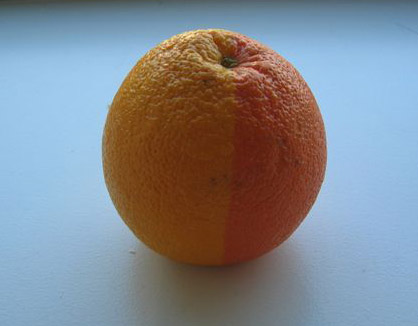
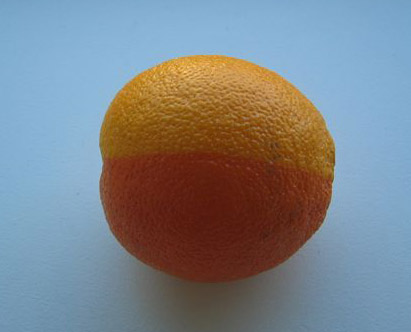
Guaranteed natural dyes. No signs of counterfeit tinkering. Or at least none that I know of.
Any ideas what happened here? Maybe this can give us some clues to what happens with orange dyed wool.
Thanks
"Natural Orange" Dyes
I found this friend buried in a heap of single-orange-colored siblings in San
Francisco Chinatown last weekend.

Guaranteed natural dyes. No
signs of counterfeit tinkering. Or at least none that I know of.
Any
ideas what happened here? Maybe this can give us some clues to what happens with
orange dyed wool.
Thanks
 Danny,
Danny,
One side in
water for a few days?
Salt water?
Maybe someone out there airbrushes
the oranges!
I dono
Best regards,
Vincent
Danny, Vincent -
The use of artificial dyes to make various foods
attractive has been going on for some time.
Perhaps this is just an
incomplete instance of that.
Regards,
R. John Howe
Hi John,
I'll stop eating from now on. So unhealthy!
Only hope
"they" don't mess up my cigars!
Best regards,
Vincent
Light or Dark
Danny,
Were the other oranges dark or light?
Did you eat the
orange?
Are there any orange groves near Nuclear Power Plants?
In the
early days of margarine, they were not allowed to color it yellow, because the
butter makers did not want the competition.
Nowdays, the farm-grown salmon
producers must label their product "artificially colored" because they feed the
salmon coloring to give them the bright orange "healthy" look.
Your orange is
very peculiar. I suppose if you gave it to an activist group, they would start
picketing orange groves.
Patrick Weiler
Danny,
Let's start an Art studio like Andy did in the days that it
mattered
Here's our first "DANVIN" production.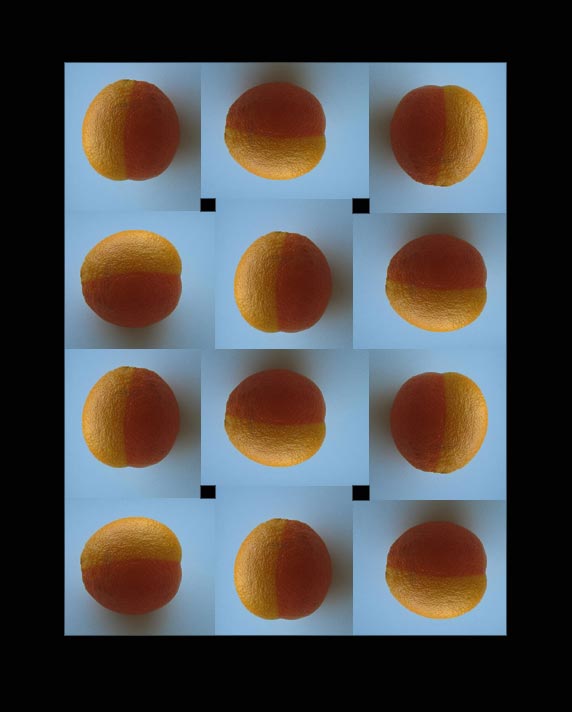
Sure it will reach topprice
in firstcoming auction after w're dead.
Cigars are a big help.
Best
regards,
Vincent
ps
The right black squares are bigger.
This creates perspective and
some tension in the composition.................
ok, I'll stop
drinking.
Vincent
Oranges, poranges
Hello Danny and Pat,
Your orange is yet another lesson that all is
not natural, regardless of what our eyes may tell us. Many oranges in the
marketplace are, like salmon, artificially colored.
In some regions,
growers have for decades and decades added artificial coloring to the fully or
partially green skins of otherwise mature oranges. The practice must be
indicated to the public, but not necessarily on the skin of each
orange.
Gassing of oranges with ethylene will blanch the skins and
achieve the commercially attractive color as well.
I used to own a small
share of an orange grove in Florida and learned more about growing them that I
ever needed to know. "Smoke pot" has an entirely different meaning in the citrus
world.
It is curious that many rug collectors assume that the color
orange in a rug is not natural when it often is and that most people assume that
the color of oranges is natural when it often is not.
Wendel
Hi Folks
Danny sent me an e-mail with the following 6 images attached.
His text is:
"Steve, a friend of mine who'd taken some pictures of this
interesting orange just sent them to me. Please post them at your convenience.
These are actually better than the first two I sent
you.
Thanks
Danny"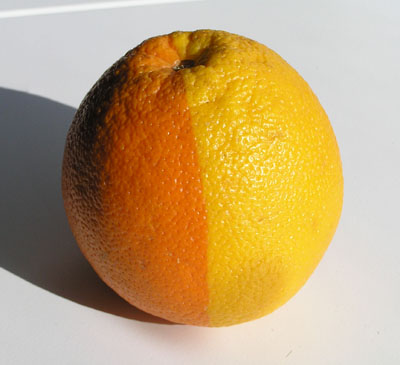
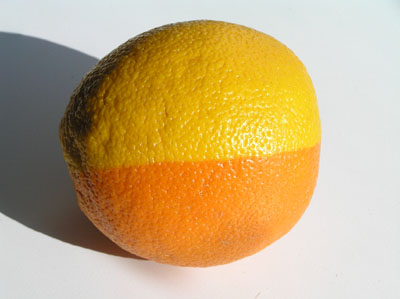
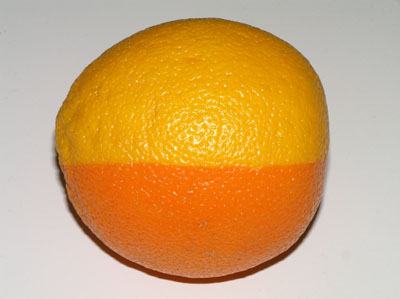
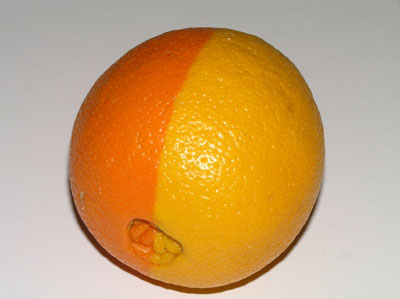
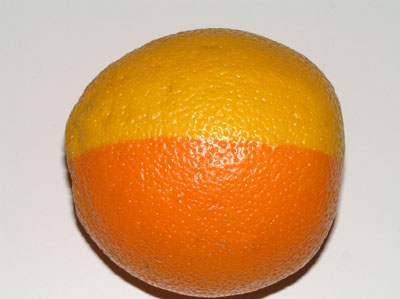
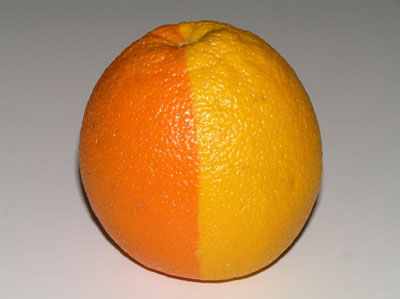
Thanks, Danny.
Steve
Price
Thank you
Thanks to you all for posting your responses. Much appreciated.
I
don't think we'll ever know what happened here - just like we never quite know
what happened many years ago when the dyemasters mixed fun substances to dye
wool for those beautiful rugs. All natural - all chemical - or somewhere in
between. I think you all will agree with that.
One can never tell. Just
like Wendel says in his post.
I suppose if it appeals to the eye, that's
what really matters. The rest is all speculation. Or one person's
opinion.
Vincent, there are 6 more (better) pictures if you want to work
on another collage. Your last one is beautiful and should be
copyrighted.
Thanks, everyone!
Which one would you buy?
The real question is ........ would you buy this piece if you could only see
the dark orange side or if you could only see the yellow side?.
Or are there
some perverse people like me who would find it attractive because it was
different?
Johanna
It all looks derivative of Andy Warhol's "art"
Update - the inside dyes - and the taste
I finally cut the orange today. It had been in the fridge for two weeks and I
feared it may not last much longer.
Here's what I have to
report:
There was a color difference on the inside as well: the orange
half was "oranger" on the inside, and the yellow half was "yellower". But the
contrast between the colors was not quite as vivid as on the outer
skin.
The taste: the orange part was noticeably sweeter than the yellow
part (unless my head was playing tricks on me).
Don't know if this new
data will change your opinions, but I thought I should throw it out there for
your analysis.
Thanks!
Hi Dany and All,
My analise is :
If both sides of the orange
contanains vitamin C, it means it is a healthy food, But, incase, next time you
buy Orange please be more carefully.
Bon Appeti !
__________________
Cevat
Kanig
Does anyone know if orange skins were ever used to produce orange dyes?
Hi Folks,
what makes organic colours dark is the amount of conjugated
multiple chemical bounds in sequence. This is synonym to high-energy state. More
often in the case of oranges the energy’s source still is the sun rather than a
nuclear power plant in the vicinity. Thanks. In other words, one half of the
orange may simply have got more light over a prolonged time. Maybe this can even
happen after harvest.
Christmas is over and I can’t send an example: for
the last couple of years here we had very wholesome looking red apples in the
shops with yellow Christmas motives on them, i.e. stars, lit candles, angels
etc. Same explanation: for a certain time a sticker, later removed, was put on
the apples where the image was to go.
Regards
Horst
Hi Horst
Your explanation occurred to me, too, but the likelihood that
exactly one half of each orange would get extra light, leaving a sharp dividing
line between the two hemispheres, seems very low to me.
Regards
Steve Price
Maybe the orange swam in a liquid for a while, to demonstrate how chemicals
can be used to change the color of the skin.
Tim
Hi Vincent
I forgot to say, I like your collage. Very clever
idea.
Regards,
Horst
The "inside" report
Thanks to everybody for potential theories.
For what its worth, the
color difference existed on the "inside" as well (though not quite as vivid as
on the outside. And I thought the orange part was sweeter than the yellow part -
but that could have been my inherent bias.
Wonder if this data will help
us reach a conclusion?
Thanks
Hi Danny,
Andy didn't eat much. He drank, took pills etc.
Because
of this he became eternally transcendental. So these things I constructed came
from him.
Andy
gives us the following conclusion: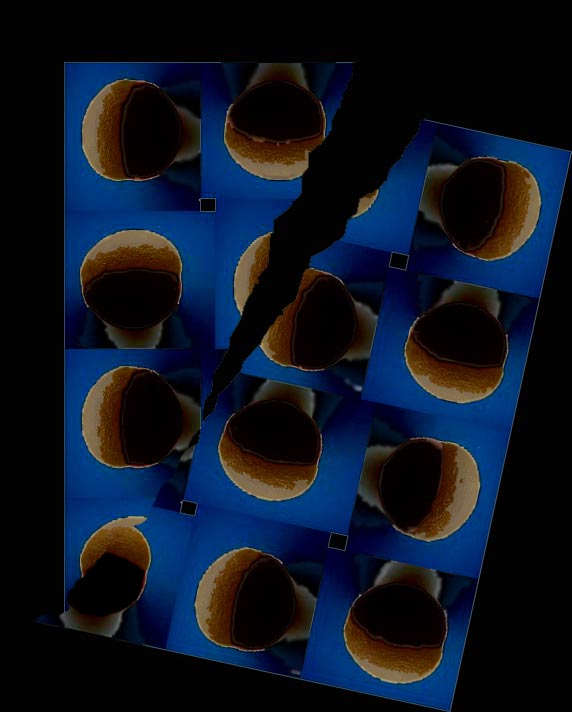
Start eating pills. Drink.
Smoke etc.
and quit the oranges.
Best regards,
Vincent
PS.
If ever you pick up the dye habit.
Never use flowers, fruits etc. In those
products the colour is already developed. Use the roots, the young leaves,
flowerbuds. I'm sure you'll get an orange/yellow colour. And maybe this has
already been done. Why not. But who, and how, am I to know?
Thanks, Vincent. This is quite something!
Now let's give you another
challenge - capturing this orange's "taste" and "smell" in your next collage.
How about giving that a try?
Cheers